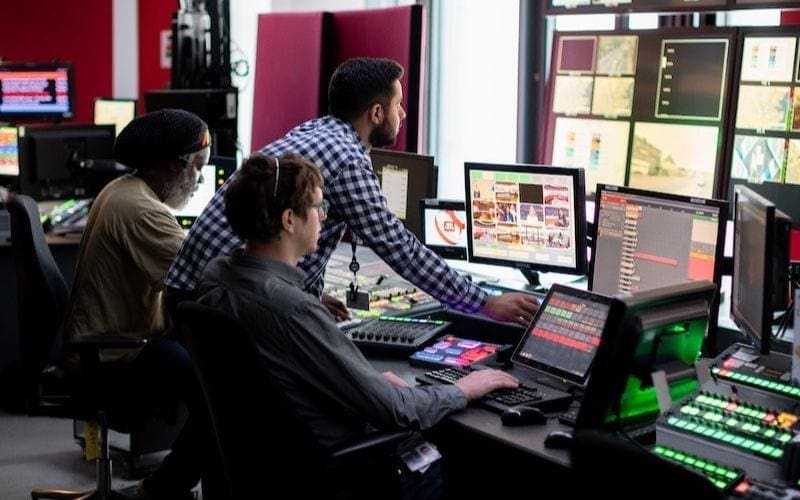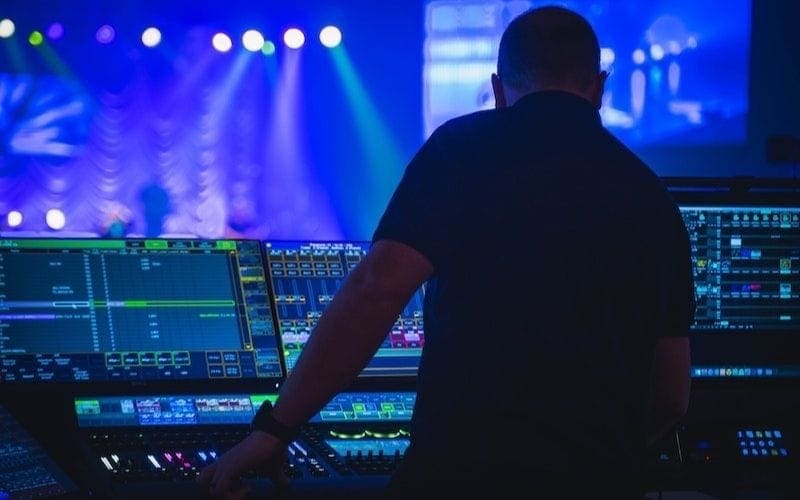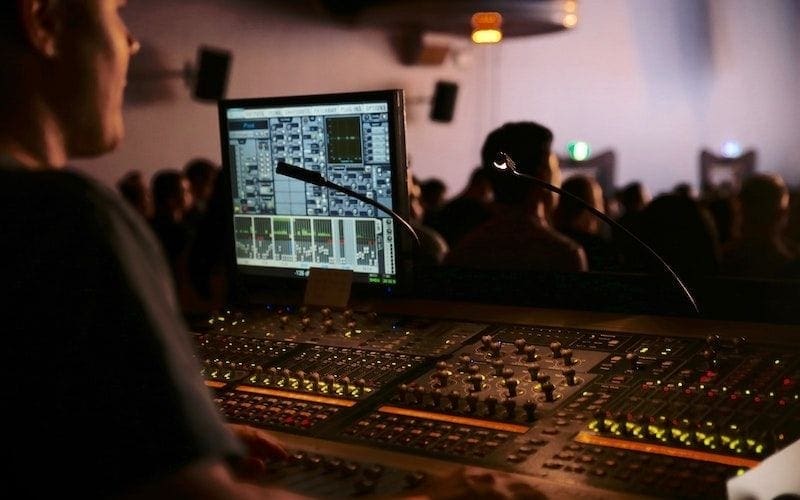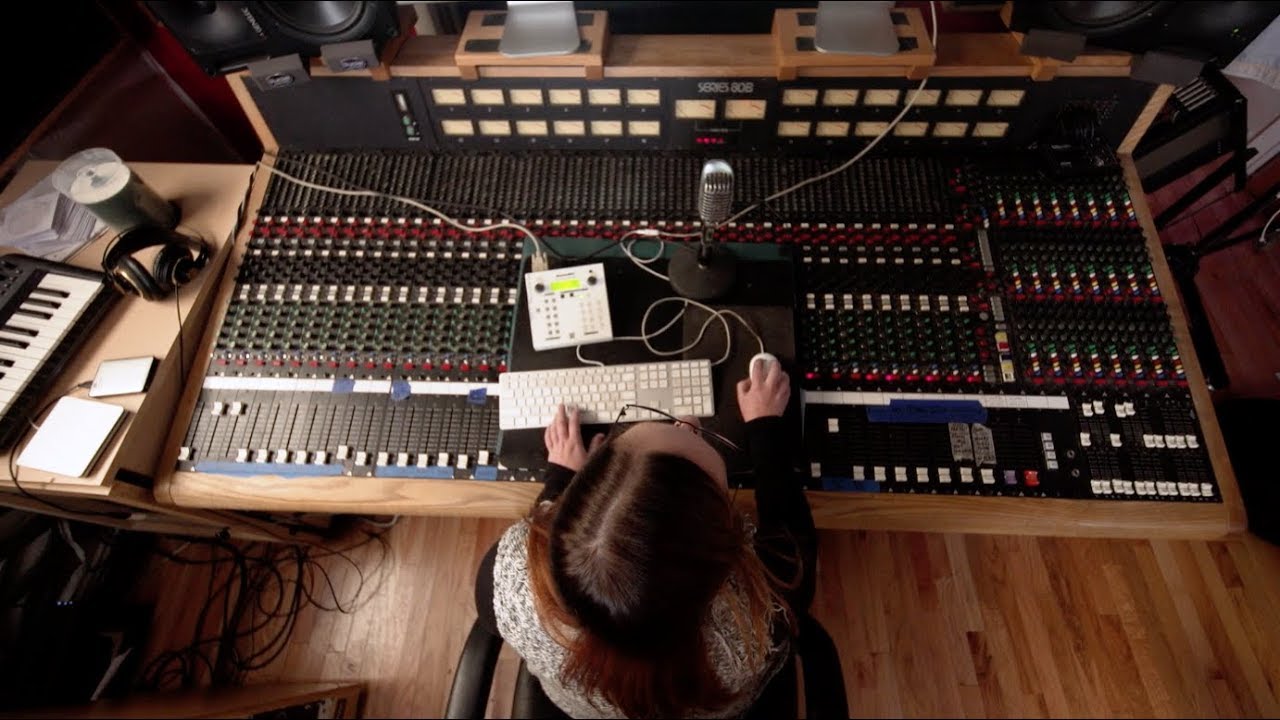Do you have an ear for music but would rather have a more technical way of showing off your musical ability? Then maybe a career as an audio/sound engineer might be for you! A sound engineer is different from a producer, writer, or performer because as an audio engineer, you will deal explicitly with all the technical and mechanical aspects of music and sound and nothing else. The sound engineer is a trained professional who works with the mechanics of recording, mixing, and reproducing sound. Let’s find out what audio engineering is, and what it takes to have a career in audio/sound engineering!

What Is Audio Engineering & What Does An Audio Engineer Do?
Firstly, audio engineers and sound engineers are terms that are often used interchangeably. However, most use ‘audio engineer’ to refer to recording or studio work, and ‘sound engineer’ to refer to live concerts and events.
An audio engineer can also be known as a recording engineer. They help with recording, balancing, and adjusting sound sources through the use of equalization, audio effects, mixing, reproduction as well as reinforcement of sound.
Instruments along with technology are used to produce sound for film, radio, television, music, and video games. The audio engineer ultimately works on all the technical aspects of a recording, which can include the placement of microphones, pre-amp knobs, and setting of levels. Being an audio engineer is a creative profession, but they are responsible for the physical recording of projects. Sound engineers will monitor microphones, sound levels, and outputs and there are four steps to commercial production of a recording which include recording, editing, mixing, and mastering.
What Is A Sound Engineer & What Does A Sound Engineer Do?

The sound engineer plays a crucial part in the music industry. If you have ever been to a concert, you may have noticed the clarity and overall quality of the music. This is down to the engineer monitoring the sound.
Sound engineers don’t necessarily just work in music but they do mix, reproduce, and manipulate the equalization and electronic effects of sound. Some will design and control the sound at seminars, auditoriums, and other venues that need sound projection for an audience to hear clearly. Sound engineers also need to do set-ups, sound checks, live sound mixing using a mixing console, and know a sound reinforcement system when working at music concerts, theatres, sports games, and corporate events.
Sound engineers use their trained musical ears and knowledge of acoustics to generate the best sound quality for various venues. Managing a large mixing board at a live show the sound engineer will adjust the sound in which the audience hears. This can be known as mixing the front-of-house sound, but there are other aspects to sound engineering.
Ultimately, there are additional types of sound engineers with specific roles and specializations. Bear in mind, it isn’t uncommon for all of these roles to be acquired by one sound person, particularly at smaller events and shows. An entire team of engineers is a bonus typically for well-funded, larger venues or tours.
Common Roles & Titles For Audio Engineers Include:
Monitor Sound Engineers
This type of sound engineer monitors the on-stage sound that a band/artist hears. You will often hear bands asking for their guitar to be turned down a bit, this is them speaking to the sound engineer.
Systems Engineers
Systems Engineers will take care of setting up amps, complex PA systems as well as speakers for artists/bands plus any other sound engineers they are working with.
Studio Sound Engineers
Working in the studio, they make high-quality recordings of music, speech, and sound effects.
Research & Development Audio Engineers
They invent new technologies, equipment and techniques to improve the procedure and art of audio engineering.
Wireless Microphone Engineers
Are accountable for wireless microphones during theatre productions, sports events and corporate events.
Game Audio Designer Engineers
They take care of the sound for video and computer game development.
Audio Engineer Salary
Now you know what the role entails, you may be wondering: how much do sound engineers make? An audio or sound engineer’s salary is usually around £15,000 for those starting and can increase to £40,000, depending on experience.
How To Become A Sound Engineer

Sound engineers come from all types of educational capabilities and backgrounds. Further education and training in radio, television, music, audio, performing arts, broadcasting, and even electrical engineering can all progress to a career as a sound engineer. Plenty of colleges in the US and universities in the UK also offer specific courses in audio engineering and sound recording. Frequently, sound engineers don’t have any formal training and will gain professional expertise and skills through learning on the job.
The main ways to get an audio engineering job are:
- Attending specific university/college courses
- Gaining an apprenticeship
- Working towards the role
- Specialist sound engineering courses run by private training providers
University Course
You can sign up for a foundation degree or degree in:
- Sound engineering and production
- Audio engineering
- Music production
To get onto a university course, you will likely need to have attained at least 1 A level, or equivalent, for a foundation degree and 2 to 3 A levels, or equivalent, for a degree.
College Course
Attend a college course in:
- Level 3 Diploma in Sound Production
- Level 3 Diploma in Music Technology
To get on this type of course, you will need 4 or 5 GCSEs in grades 9 to 4 (A* to C), or equivalent, for a level 3 course.
Sound Engineer Apprenticeships
If you would rather go down the job route, you can complete a creative venue technician or technical theatre advanced apprenticeship, which has options in sound. You will have to have gained 5 GCSEs in grades 9 to 4 (A* to C), or equivalent, including English and Maths, to be accepted on an advanced apprenticeship.
Work
Sometimes you can progress through work experience, for example starting out as a runner or an assistant in a recording studio. It is not always the most glamorous job, but you can work your way up by learning basic tasks and making key contacts through networking.
Volunteering
Another way is to volunteer at community music events, DJ projects, hospital or community radio, or mix and record music in a home studio and post your work online.
Other Routes
Short courses often offered by private training providers help you to build up your skills and knowledge without committing to going full-time to university or college.
Tips For Audio Engineering
Like most jobs in the music industry, experience is key to getting sound engineer jobs. However, also being able to make contacts can be important when looking for future job opportunities. Having a good understanding of music and recording technology is a must, but you may also discover it is beneficial to understand physics and electronics.
Some other key attributes to help you to succeed as an audio engineer are:
- Ensure you have good attention to detail
- Good understanding of computer operating systems, hardware and software
- Able to work closely with others
- Be able to adapt under pressure and accept criticism
- Be open minded and flexible to change
- You will need to have perseverance and determined to succeed
- Good customer service skills
- Understand media production and communication
Tasks For Sound Engineers

Some general day-to-day tasks will include:
- Organise recording sessions with producers and artists
- Set up equipment in the studio including microphones
- Ensure the volume and recording levels are accurate
- Manage recording equipment and create effects
- Record every instrument and vocals onto separate tracks
- Mix tracks to create the ultimate ‘master’ track
- Log recordings and other information to the session in the studio archive
It is always good to keep in mind that even though your work may be in a recording studio, it also has the potential to be emotionally demanding with nights away from home – especially if you are required to go on a tour.
If this is still the career path you want to choose, then it is worth considering how you can progress. When you have experience, you can concentrate on a certain technical skill, become a music producer, or studio manager, or begin your recording studio.
Summary For Audio Engineering

So, there you have it – all you need to know about what an audio/sound engineer does! If you have great knowledge of audio and you are passionate about becoming an engineer, there are plenty of routes you can take in order to achieve your goal. If you are curious about learning more, then maybe a college course or an audio engineering degree is for you. Alternatively, if you want to get stuck in straight away, you can try looking for work experience – whether that is through volunteering or an apprenticeship. This way you can discover very quickly if it is the right path for you. If your understanding develops, you’ll come out the other side with way more knowledge than you had before!
To be a good audio engineer takes a lot of resilience, so make sure you work hard. Nobody said there is an easy route, but once you find a path that’s right for you, we are sure you will have the potential to succeed!




